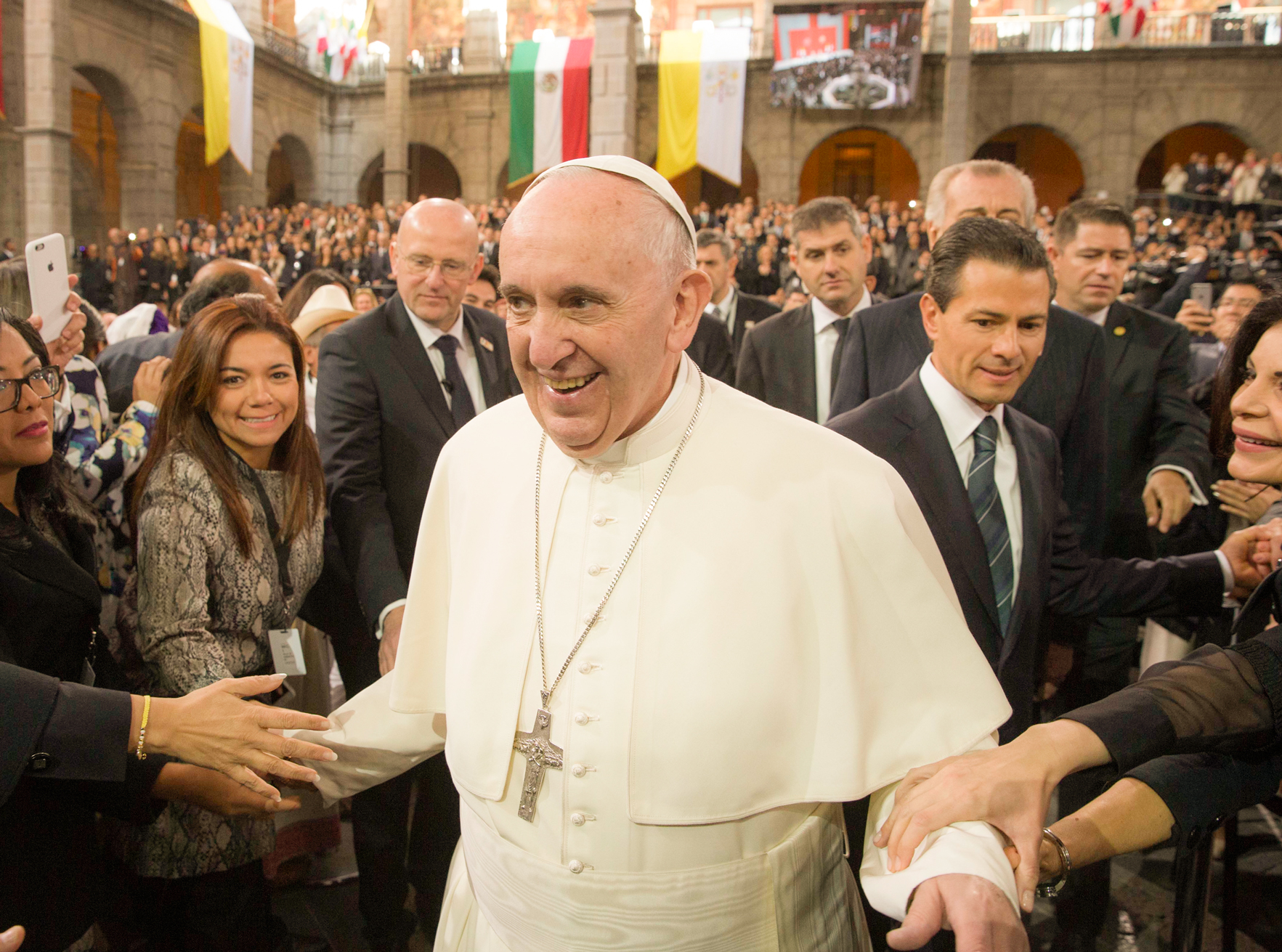Pope Francis today issued an apostolic exhortation on the universal call to holiness. While it reiterates certain themes that have been seen in prior documents, it is a powerful call. If we don’t distort it.
First, the facts. The document has five chapters.
The first reiterates and humanizing Vatican II’s insistence that all Christians are called to “something higher” – to holiness.
The second identifies “two subtle errors” in some detail: a contemporary Gnosticism and a contemporary Pelagianism. These two errors were first pointed out in Evangelii Gaudium, and were also the subject of a recent CDF document.
The third is a commentary on the Beatitudes, but one which culminates in “the great criterion” present in the enumeration of the works of mercy in Matthew 25. In this chapter, once again, Francis identifies two competing errors: service without interior spiritual development, and the pious who marginalize the importance of service.
The fourth and fifth chapters constitute spiritual direction for the living out of this call, focusing on certain characteristics of holiness, and warning of the necessity of proper discernment of spirits. These sections are especially interesting because they feature the juxtaposition of Francis’s sense of joy – not for the first time, he addresses the need for a sense of humor – with his very realistic sense of spiritual evil, especially a lengthy insistence on the devil.
There are two ways to read this document. One is as the latest battle in an intra-church culture war. Much commentary will in fact highlight this perspective. It will pit the liberalizing Francis and the conservative forces of evil (or good, depending on the website). The first-take in the New York Times exemplifies this. Its proof-texting from the document directs the reader to the “correct” conclusions about what Francis is doing. For example, it ends with the quote: “Sowing peace all around us. That is holiness.” One would never know that this phrase – rather than representing a final conclusion – is in fact one of eight conclusions to each section in Chapter 3 treating a particular beatitude.
This reading should be rejected on the grounds of the document itself. As Francis indicated in Evangelii Gaudium, Catholics should say “no to warring amongst ourselves” (a section very much worth re-reading in post-Amoris days). This document quite impressively displays that Francis’s concerns are typically double-edged, giving the lie to the liberal-conservative split. Rather, this is a document that is getting back to the heart of Francis’s papacy in the first place – not the battle over intrinsically evil acts, but the call to a genuine, palpable sense of lived holiness.
Unsurprisingly, the Times account goes straight to what “issues” Francis is promoting or minimizing. But this is simply not news. He’s said this before, and in fact, there has been a “consistent ethic” in the Church’s magisterial documents continuously in recent decades. For example, Francis is clearly not saying that the Church should weaken its stance against abortion:
Our defence of the innocent unborn, for example, needs to be clear, firm and passionate, for at stake is the dignity of a human life, which is always sacred and demands love for each person, regardless of his or her stage of development. Equally sacred, however, are the lives of the poor, those already born, the destitute, the abandoned and the underprivileged, the vulnerable infirm and elderly exposed to covert euthanasia, the victims of human trafficking, new forms of slavery, and every form of rejection. We cannot uphold an ideal of holiness that would ignore injustice in a world where some revel, spend with abandon and live only for the latest consumer goods, even as others look on from afar, living their entire lives in abject poverty. (#101)
This isn’t new. Anyone who pits the clear teachings of the Church on all these issues “against” one another is being led by the desire to pursue a political ideology, not the Gospel. Or they are being led by a utilitarianism that is the antithesis of the pope’s approach to the human person. Moreover, in the same section, Francis chides those who neglect the life of the spirit:
there is the error of those Christians who separate these Gospel demands from their personal relationship with the Lord, from their interior union with him, from openness to his grace. Christianity thus becomes a sort of NGO stripped of the luminous mysticism so evident in the lives of Saint Francis of Assisi, Saint Vincent de Paul, Saint Teresa of Calcutta, and many others. For these great saints, mental prayer, the love of God and the reading of the Gospel in no way detracted from their passionate and effective commitment to their neighbours; quite the opposite. (#100)
Pope Benedict wrote, in a piece I frequently recommend, that the Christian life involves coming to encounter Jesus fully present in both the Eucharist and the poor. Catholicism is committed to a variety of truth claims – as really true – and these involve both Eucharistic claims and social justice claims. Indeed, these mutually support one another. This gives the lie to those who worry that Francis is “leading us back to the 1970’s.” Not at all. Francis’s suspicion of superior intellectuals who look down on the popular piety of the people was learned precisely in the 1970’s! And this suspicion is at the heart of the “intellectual error” of contemporary Gnosticisms:
Gnostics think that their explanations can make the entirety of the faith and the Gospel perfectly comprehensible. They absolutize their own theories and force others to submit to their way of thinking. A healthy and humble use of reason in order to reflect on the theological and moral teaching of the Gospel is one thing. It is another to reduce Jesus’ teaching to a cold and harsh logic that seeks to dominate everything. (#39)
He goes on:
When somebody has an answer for every question, it is a sign that they are not on the right road. They may well be false prophets, who use religion for their own purposes, to promote their own psychological or intellectual theories. God infinitely transcends us; he is full of surprises. We are not the ones to determine when and how we will encounter him; the exact times and places of that encounter are not up to us. Someone who wants everything to be clear and sure presumes to control God’s transcendence. (#41)
The mistake is to read this in only one (ideological) direction. It is clearly concerned with those who want a theology which “controls” reality – in fact, controls God’s action. But such a controlling theology is equally seen in forms of “liberal” theology that insist on intellectual formulae, often drawn from the latest language fashionable in the academy. To both camps, Francis insists that holiness is quite simply not a matter of complete knowledge.
Some might say, “Good – it is a matter of practice!” But here there is the other possible error: the “contemporary Pelagians.” These new Pelagians make holiness a matter not of the intellect, but of their will – THEIR will, as meeting the demands of what God commands.
[S]ome Christians insist on taking another path, that of justification by their own efforts, the worship of the human will and their own abilities. The result is a self-centred and elitist complacency, bereft of true love. This finds expression in a variety of apparently unconnected ways of thinking and acting: an obsession with the law, an absorption with social and political advantages, a punctilious concern for the Church’s liturgy, doctrine and prestige, a vanity about the ability to manage practical matters, and an excessive concern with programmes of self-help and personal fulfilment. Some Christians spend their time and energy on these things, rather than letting themselves be led by the Spirit in the way of love, rather than being passionate about communicating the beauty and the joy of the Gospel and seeking out the lost among the immense crowds that thirst for Christ. (#57)
Once again, the reading here plainly invites a recognition that the target is not exclusively “liberal” or “conservative.” Those with “punctilious concern” for liturgy are not just found on one side of ecclesial debates… nor are those who have “an absorption with social and political advantages”… nor those with “a vanity about the ability to manage practical affairs.” The problem here is a lack of passion about missionary discipleship, evangelizing with joy. Both liberals and conservatives try to “control spaces” rather than “initiate processes.” (another EG theme!)
The Gnostics and Pelagians, in the end, are focused on themselves: their ideas, their will. They are not focused on fidelity to Christ and the way of holiness. They are not open to the kind of discernment that will live out this call to holiness as a missionary disciple to others. They are “seduced by these deceptive ideas, which reflect an anthropocentric immanentism disguised as Catholic truth.” (35)
“They.”
Well, herein lies the challenge. Francis’s work, both prior to and during his papacy, is masterful at the juxtaposition of powerful images, often starkly contrasting ones. He tells parables, and plenty of Jesus’s parable appear in the form of contrast-examples. Francis is telling a parable here, one he already started telling in Evangelii Gaudium, about false forms of faithfulness. The linkages to historic Gnosticisms and Pelagianism are not the point; the point is to use the images to capture tendencies in today’s church.
Whose tendencies?
I think this is the key question. The key question to avoid. Francis’s use of images – especially contrast-images – has the unintended effect of making it VERY easy to turn these images into stones to hurl at one another. The images can themselves turn into bludgeons that indicate the very “spiritual worldliness” Francis denigrates in Evangelii Gaudium: “instead of evangelizing, one analyzes and classifies others, and instead of opening the door to grace, one exhausts his or her energies in inspecting and verifying.” (EG 94)
This is happening in the Church. And I cannot state forcefully enough: PLEASE. STOP. DOING. THIS. Stop using Francis’s powerful teachings for “spiritually worldly” purposes. It is a thorough, powerful, teaching office that Francis is exercising. And what he is doing (he says this!) is not creating a new class of political players in the Church to replace the old class. Instead:
May the Lord set the Church free from these new forms of gnosticism and pelagianism that weigh her down and block her progress along the path to holiness! These aberrations take various shapes, according to the temperament and character of each person. So I encourage everyone to reflect and discern before God whether they may be present in their lives. (#62)
“Everyone” means “everyone”! Francis here is saying we all should examine our failings in these regards. So too should we examine ourselves on other matters Francis writes about in this exhortation: on our conformity to the Beatitudes, on our willingness to recognize the need for works of mercy in everyone we meet, on our tendency to confuse the Spirit of Christ with the spirits of the world and the devil.
I have long thought that Vatican II’s universal call to holiness was the single most important development of the entire Council. It is a remarkably challenging development, but it is one that invites everyone to the full, joyous, surprising following of Christ. Christ wants all of us. I never tire of saying this to the seminarians I am teaching in Social Ethics classes: the social encyclicals demonstrate that our passionate response to God’s love should be seen in all aspects of our lives. This isn’t partisan. In fact, if one sees it as partisan, this is likely a sign that one is not responding to the fullness of the Gospel. Read properly, Francis’s latest exhortation is a great step toward all Catholics responding better to this call.
As long as we read it as exactly that, rather than as a document to be proof-texted for “our side.”





Trackbacks/Pingbacks